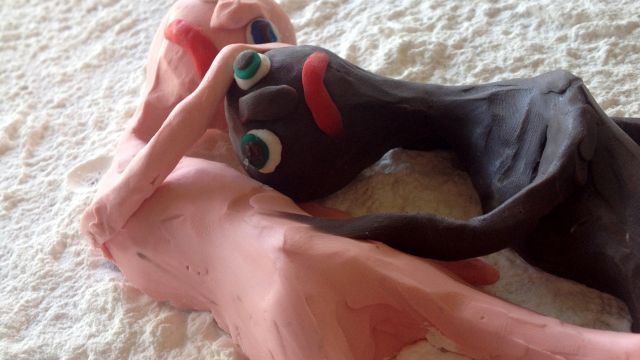F**king Parasites
Ninna Tersmann began working on her play about asylum seekers in Sweden ten years ago. She interviewed refugees and asylum speakers with traumatic experiences whose stories were nevertheless not believed. She interviewed frustrated lawyers, police officers, doctors, nurses, interpreters and politicians. Ten years ago, she says in a program note, the situation was already difficult.
We can imagine, if we care to, how much more difficult things are now with the mass exodus from Syria, Libya, Yemen… The stories and the characters featured in the play have, not surprisingly, the ring of truth. Sadly, they are stories matching those we hear and read about, if we care to, from Australian Immigration Detention Centres.
The title F**king Parasites suggests the kind of angry xenophobia with which we are familiar, but the play itself is much quieter than the title suggests – an ironic title given the two vulnerable young women (Elizabeth Esguerra and Asha Khan), waiting and waiting in a refugee holding camp – or whatever is the appropriate euphemism – for ‘verification’.
They bicker but rely on each other; they tell each other their stories – stories we sense they have already told over and over in this limbo, as children seek solace in the same stories told over and over, about their escapes from their homelands, their traumatised parents and their encounters with their helpers and keepers. One waters a tree, but also rips bits of it off. The other writes poems and remains in pyjamas throughout.
Unfortunately, however, impeccable intentions and representative truth do not make for good drama – and since this is a play that risks preaching to the choir in any case, the reliance on ‘worthy content’ per se is self-defeating. Ms Tersmann has assembled disturbing, touching and sometimes vivid material, but these selections appear to run in random order: she has not constructed a discernible developing situation. When the end comes, it should be far more shocking than it is, but there has been only the most belated set-up. What should be devastating is merely… sad.
The virtue of the piece is that the two women, isolated and lonely, people their sealed world with role playing, acting out their experiences – at times in satirical form. Ms Esguerra takes advantage of this - although we sense she coulddo more – there’s a twinkle in her eye. Ms Khan opts for minimalism: a crushed, exhausted melancholy. Or perhaps that is the way the very experienced Adam J A Cass has – surprisingly - directed them. Naturalistically speaking, the two women are depressed and enervated, but does that mean flat and monotonous delivery?
By contrast, the production’s design, also by Mr Cass, is pointed and blackly comic. The furniture, including a kitchen bench and even a tree, is child-size and made of colourful Lego-like plastic bricks. The black stage is painted with a restricted white central area and narrow white paths to which the women stick rigorously. Harsh overhead lighting from bare fluoro bulbs completes the concentration camp feel. I wish that as much imagination could have been put into performance and that the text, on this ever-growing humanitarian crisis, could have been better structured.
Michael Brindley
Subscribe to our E-Newsletter, buy our latest print edition or find a Performing Arts book at Book Nook.

